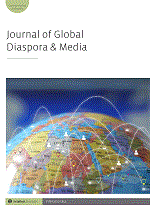-
f Introduction to the Special Issue on ‘Textures of Diaspora and (Post-)Digitality: A Cultural Studies Approach’
- Source: Journal of Global Diaspora & Media, Volume 3, Issue Textures of Diaspora and (Post-)Digitality: A Cultural Studies Approach, Jun 2022, p. 3 - 11
-
- 01 Jun 2022
- Previous Article
- Table of Contents
- Next Article
Abstract
This editorial of the Special Issue ‘Textures of Diaspora and (Post-)Digitality: A Cultural Studies Approach’ explores the digital agency of diasporic communities by showing how cultural and literary studies genuinely contribute to scholarly debates and our understanding of digital diasporas. It explores the implications of the digital in a (post-)digital age, one in which the notion of diaspora is used to refer to actual ethnic, religious communities and to collectives that do not necessarily share any common origin or history but articulate their communality through a ‘diaspora rhetoric’. It uses an approach that concentrates on the medial, cultural and aesthetic dimensions of diasporic (self-)representations, positionings and practices in cyberspace. It brings into focus the ‘textures’ of these communities and points to the need to decode diasporic imageries and the many meanings of those portrayals. It studies the textual and visual language with which diasporic communities are imagined in the digital space.
Funding
- DFG, German Research Foundation (Award 404354183 and 353492083)
- REC-LIT (Award RTI2018-094607-B-I00 (MCI/AEI/FEDER, UE))



